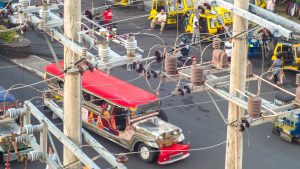In 2020, the Philippines House of Representatives passed Bill No. 78, which would remove foreign ownership restrictions on assets classified as public services. In the Philippines there is a legal distinction between public services and public utilities. A public utility, according to the Constitution, must be at least 60 percent owned by Filipino citizens. As reported by Rappler last year, the bill narrows the definition of a public utility to only those entities engaged in the “distribution of electricity, transmission of electricity, water pipeline distribution, and sewerage pipeline.”
Any activity that falls outside of these categories including telecommunications, electricity generation, and transportation, would be considered a public service (rather than a utility) and be eligible for 100 percent foreign ownership. The rationale for this change is that a small number of Filipino firms currently dominate these sectors, and that such concentrated market power is causing monopoly profits to flow back to just a few key players. The result is higher consumer prices and less investment. In theory, opening these sectors fully to foreign capital will intensify competition and thus produce lower prices for consumers and more efficient investment.
After sitting on it for over a year, the Philippines Senate passed their version in mid-December. In the Senate version airports and seaports are considered public utilities and thus restrictions on foreign ownership remain, but other industries such as airlines, domestic shipping and railways would be completely opened up. The Senate bill also contains provisions meant to safeguard the sovereignty of critical infrastructure assets, such as a prohibition on ownership stakes by foreign SOEs. The bills will now be reconciled and then passed onto President Duterte to be signed into law.
Both the House and Senate bills passed with pretty strong support. But the role of foreign capital in critical infrastructure, especially areas like telecommunications, is a huge political minefield. It is very common for states to place restrictions on foreign ownership in these sectors and, in Southeast Asia, states or state-linked companies often simply own and operate such assets themselves. The idea that a foreign company can have 100 percent ownership over a telecommunications network or a railway is very controversial.
The Philippines, likely because of its close ties with the United States, has often been ahead of the curve in Southeast Asia when it comes to privatizing public services and tapping the power of markets to provide essential infrastructure. They unbundled and privatized key services like electricity generation and municipal water earlier and more successfully than peers such as Indonesia.
There is, however, a sort of Catch-22 when you privatize public services, which is that if you choose to go that route you are now letting profit determine investment and pricing decisions by firms on the supply side. This is one reason why Filipino consumers often pay some of the highest rates in the region for their electricity and water. In order to prevent the market from squeezing consumers too hard, these sectors need to be both well regulated and genuinely competitive. And clearly Filipino legislators believe they cannot really be competitive if incumbent domestic firms are able to hold monopoly positions and foreign challengers are restricted to minority ownership stakes.
Dialing in the optimal balance between domestic and foreign capital, while also keeping an eye on the sovereignty of key national infrastructure, is very tricky. Many of the Philippines’ neighbors don’t even attempt it, or do so only half heartedly, allowing state-linked companies to dominate critical industries precisely so they don’t need to make such trade-offs.
But the Philippines has a stronger propensity for market-based solutions, and so it is pushing to widen the definition of a public service and open them more fully to private capital, whether it comes from Filipino or foreign investors. Will this achieve the aims of boosting investment and lowering consumer prices, while keeping critical infrastructure safe? We don’t know, but it certainly presents a contrast to business as usual in many other countries in the region and it will be interesting to see how it plays out.

































